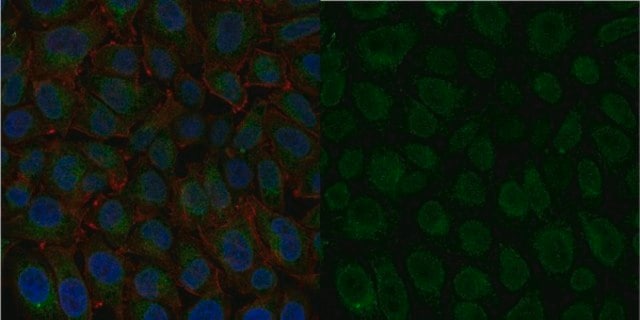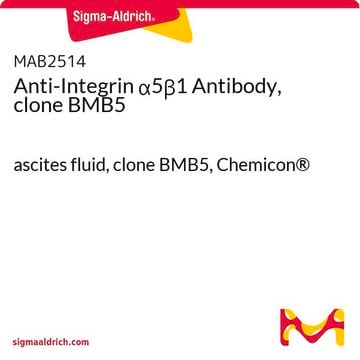MABT201
Anti-Integrin alpha5 (Preservative Free) Antibody, clone SNAKA51
clone SNAKA51, from mouse, purified by using protein G
Synonyme(s) :
Integrin alpha-5, CD49 antigen-like family member E, Fibronectin receptor subunit alpha, Integrin alpha-F, VLA-5, CD49
About This Item
Produits recommandés
Source biologique
mouse
Niveau de qualité
Forme d'anticorps
purified immunoglobulin
Type de produit anticorps
primary antibodies
Clone
SNAKA51, monoclonal
Produit purifié par
using protein G
Espèces réactives
human
Technique(s)
activity assay: suitable
immunocytochemistry: suitable
western blot: suitable
Isotype
IgG2α
Numéro d'accès NCBI
Numéro d'accès UniProt
Conditions d'expédition
wet ice
Modification post-traductionnelle de la cible
unmodified
Informations sur le gène
human ... ITGAV(3685)
Catégories apparentées
Description générale
Immunogène
Application
Immunocytochemistry Analysis: A representative lot of this antibody detected Integin alpha 5 in Primary human foreskin fibroblasts (hFF) (Clark, K., et al. (2005). J Cell Sci. 118(Pt 2):291-300.; Valdembri, D., et al. (2009). PLoS Biol. 7(1):e25.).
Cell Structure
Qualité
Flow Cytometry Analysis: 1 µg of this antibody detected Integrin alpha5 in 0.5X10^6 HeLa cells.
Description de la cible
Forme physique
Stockage et stabilité
Remarque sur l'analyse
HeLa cells
Autres remarques
Clause de non-responsabilité
Vous ne trouvez pas le bon produit ?
Essayez notre Outil de sélection de produits.
En option
Code de la classe de stockage
12 - Non Combustible Liquids
Classe de danger pour l'eau (WGK)
WGK 2
Point d'éclair (°F)
Not applicable
Point d'éclair (°C)
Not applicable
Certificats d'analyse (COA)
Recherchez un Certificats d'analyse (COA) en saisissant le numéro de lot du produit. Les numéros de lot figurent sur l'étiquette du produit après les mots "Lot" ou "Batch".
Déjà en possession de ce produit ?
Retrouvez la documentation relative aux produits que vous avez récemment achetés dans la Bibliothèque de documents.
Notre équipe de scientifiques dispose d'une expérience dans tous les secteurs de la recherche, notamment en sciences de la vie, science des matériaux, synthèse chimique, chromatographie, analyse et dans de nombreux autres domaines..
Contacter notre Service technique







